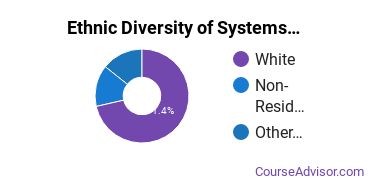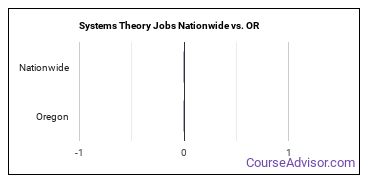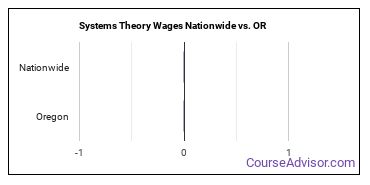Systems Theory Schools in Oregon
2 Systems Theory students earned their degrees in the state in 2022-2023.
In this state, Systems Theory is the 217th most popular major out of a total 277 majors commonly available.
Education Levels of Systems Theory Majors in Oregon
Systems Theory majors in the state tend to have the following degree levels:
| Education Level | Number of Grads |
|---|---|
| Master’s Degree | 1 |
| Doctor’s Degree (Research / Scholarship) | 1 |
| Doctor’s Degree (Professional Practice) | 1 |
| Doctor’s Degree (Other) | 1 |
Gender Distribution
In Oregon, a systems theory major is more popular with men than with women.

Racial Distribution
The racial distribution of systems theory majors in Oregon is as follows:
- Asian: 0.0%
- Black or African American: 0.0%
- Hispanic or Latino: 0.0%
- White: 100.0%
- Non-Resident Alien: 0.0%
- Other Races: 0.0%

Jobs for Systems Theory Grads in Oregon

Wages for Systems Theory Jobs in Oregon

Most Popular Systems Theory Programs in OR
There is one school in the state that offers this degree.
Most students complete their degree in 4.69 years. The student to faculty ratio is 17 to 1. 89% of students get financical aid.
Request InformationRelated Majors in Oregon
Below are some popular majors in the state that are similar to systems theory.
| Major | Annual Graduates in OR |
|---|---|
| Other Interdisciplinary Studies | 364 |
| Biological & Physical Science | 292 |
| International Studies | 166 |
| Interdisciplinary Studies | 86 |
| Sustainability Science | 56 |
| Gerontology | 46 |
| Mathematics & Computer Science | 39 |
| Peace Studies & Conflict Resolution | 36 |
View all majors related to Systems Theory
Explore Major by State
Alabama
Arkansas
Connecticut
Florida
Idaho
Iowa
Louisiana
Massachusetts
Mississippi
Nebraska
New Jersey
North Carolina
Oklahoma
Rhode Island
Tennessee
Vermont
West Virginia
View Nationwide Systems Theory Report
References
- College Factual
- National Center for Education Statistics
- O*NET Online
- Image Credit: By Hiroki Sayama, D.Sc. under License
More about our data sources and methodologies.

